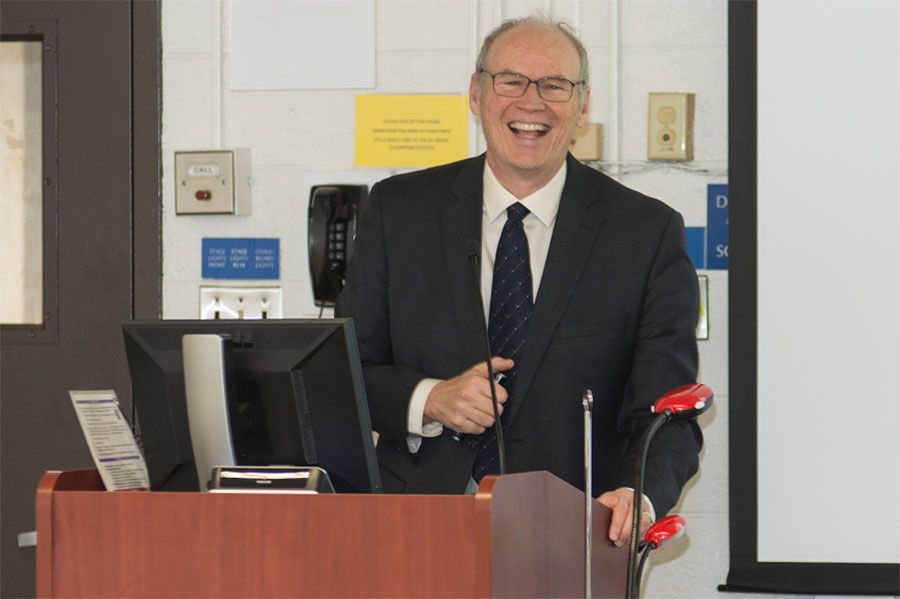
As he spoke at the Medical Education Grand Rounds on Dec. 4, Joseph C. Kolars, M.D., Josiah Macy Jr. Professor of Health Professions Education and senior associate dean for education and global initiatives at the University of Michigan Medical School, painted a picture: “What if the world were a village of 100 people?” he asked. “What would that look like?”
Among the numbers Kolars used to illustrate the hypothetical village, there would be 61 Asians, 13 Africans, nine Latin Americans, 12 Europeans, and five villagers from the United States and Canada; 76 would have access to electricity; only one would have a college education; 50 would be malnourished, and one would die of starvation; and 48 would live on less than $2 a day.
“I think it’s important for those of us in academic institutions to speak to this reality,” Kolars said. “Where should we be positioning ourselves as great institutions that are going to take on the world’s problems?”
Kolars, in his presentation titled “Are Global Health Initiatives an Imperative for Medical School Education Programs?” argues that global health initiatives — “improving the economic, social, and environmental conditions that people live in to try to eliminate avoidable disease, disability, and deaths” — are a valuable aspect of medical education programs. Typically, according to Kolars, global health initiatives are seen as peripheral, even volunteer activities, when they should be viewed as central to institutions’ core missions. By incorporating global health into the tripartite mission of academic health systems, which is structured around education, research, and clinical care, institutions will benefit while making a significant impact on international health.
So, how do institutions capitalize on improving global heath? Tackling health equity isn’t necessarily a moral issue, nor is it a funding issue, at least not entirely. “[Health equity] is not just a space for do-gooders that are humanitarian in nature,” Kolars said. “Disparities are associated with a financial drag on the economy, political instability, armed conflicts, disease reservoirs, and epidemics.”
Moreover, he added, the amount of money that institutions, such as his own, the University of Michigan, invested in global crises like Ebola could be funneled into a greater global initiative. “Most of us in academic health centers are reactive, rather than thinking about how to tackle some of these [health] issues in a pro-active way … Academia cannot figure out how to engage and be part of a solution.”
What is strategic, then, for academic institutions, which arguably must consider financing and memorandums of understanding, is focusing on incentives: innovation, collaboration, and the value of platforms.
One of the big hallmarks of global health, Kolars explained, is the disruptive vector, or “invasive species spreading disease.” He pointed to the Toyota Corolla, the innovative “invasive species” that contributed to the collapse of the auto industry in “Motor City” Detroit. “The Japanese Corolla came by and said, ‘we can get people from Point A to Point B pretty well, and we can do it cheaper and with better quality,” Kolars explained. “So over the years, the Detroit auto industry withered, and we ceded that whole agenda to a global industry.”
Similar innovations, such as India’s approach to cataract surgeries, Kolars said, are potentially just as powerful, so American institutions need to pay attention. “I think the Toyota Corolla, for health care, is going to come from some of these places,” he said. “I would argue that academic institutions need to be a part of that innovation.”
Additionally, collaboration between American and international schools, whether through student exchange programs or research, can be mutually beneficial and should be prioritized. In moving away from the “ivory tower” stereotype, institutions should also focus on multidimensional, cross-departmental platforms. The University of Michigan, for example, has ongoing collaborative platforms with Ghana, China, Brazil, India, Israel, and Ethiopia, “win-win scenarios” that are contributing to developments in research and promoting clinical missions. “We’re using these to create a center of gravity to advance education,” Kolars said.
By placing the onus on institutions to not only track global health, but also to participate, particularly in low-resource areas, Kolars believes institutions can strengthen their medical programs.
“If I could make a rule right now, every learner would get into a place where health equity is a primary driver for their learning [experience],” Kolars said. “I think global health initiatives are increasingly an important part of the tripartite mission of medical schools. They should be foundational. Health sciences schools can optimally partner with schools in a low-resource setting, [and] this [means] going in with mutual benefit.”


